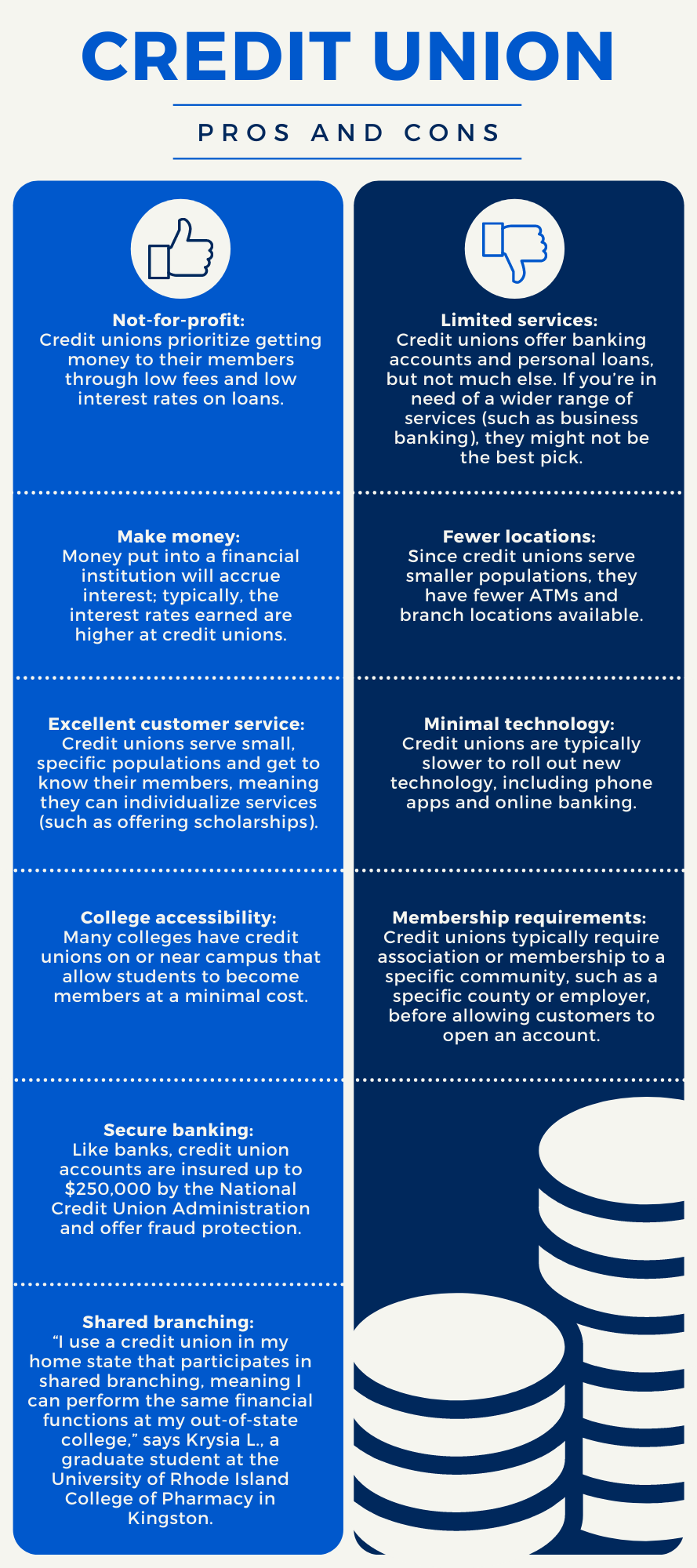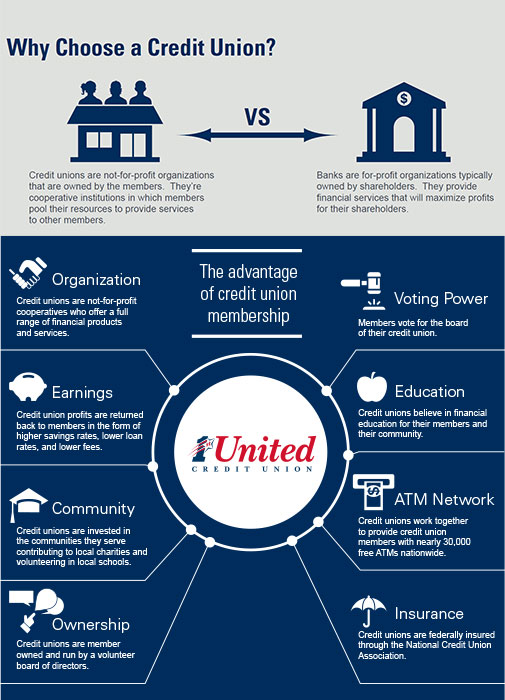Credit Union in Wyoming: Discover the Perks of Member-Focused Banking
Credit Union in Wyoming: Discover the Perks of Member-Focused Banking
Blog Article
The Ultimate Guide to Recognizing Debt Unions

Credit rating unions stand as one-of-a-kind economic entities, rooted in principles of mutual assistance and member-driven operations. Nonetheless, beyond their fundamental values, recognizing the elaborate operations of cooperative credit union includes a much deeper exploration. Deciphering the intricacies of membership qualification, the evolution of solutions used, and the distinct advantages they bring needs a comprehensive evaluation. As we browse through the intricacies of cooperative credit union, an insightful journey awaits to clarify these member-focused establishments and how they vary from typical financial institutions.
What Are Cooperative Credit Union?
Credit rating unions are member-owned banks that offer a variety of banking solutions to their participants. Unlike typical banks, lending institution operate as not-for-profit organizations, suggesting their main focus gets on serving their participants rather than maximizing revenues. Members of a lending institution normally share a typical bond, such as functioning for the same employer, belonging to the same area, or becoming part of the same company.
One of the key advantages of credit rating unions is that they frequently provide higher rate of interest on interest-bearing accounts and lower rate of interest on financings compared to banks. Credit Unions in Wyoming. This is because lending institution are structured to benefit their members directly, permitting them to hand down their incomes in the kind of far better rates and less fees. In addition, credit unions are recognized for their personalized customer care, as they prioritize constructing relationships with their members to understand their one-of-a-kind monetary demands and goals
Background and Evolution of Credit Scores Unions
The roots of member-owned monetary cooperatives, recognized today as lending institution, trace back to a time when neighborhoods sought options to typical financial organizations. The idea of credit unions originated in the 19th century in Europe, with Friedrich Wilhelm Raiffeisen frequently attributed as the pioneer of the cooperative financial motion. Raiffeisen established the first acknowledged lending institution in Germany in the mid-1800s, emphasizing area support and self-help concepts.
The evolution of credit history unions continued in The United States and copyright, where Alphonse Desjardins established the initial credit history union in copyright in 1900. Shortly after, in 1909, the initial U.S. cooperative credit union was developed in New Hampshire by a group of Franco-American immigrants. These very early lending institution operated the basic principles of common help, democratic control, and member ownership.
In time, lending institution have grown in popularity worldwide because of their not-for-profit structure, concentrate on offering members, and supplying competitive monetary products and solutions. Today, credit history unions play a vital function in the monetary sector, offering obtainable and community-oriented banking choices for organizations and individuals alike.

Membership and Qualification Criteria
Subscription at a credit history union is typically restricted to individuals meeting details eligibility requirements based upon the establishment's founding principles and governing requirements. These requirements often include aspects such as geographical location, employment condition, subscription in specific companies, or affiliation with particular teams. Cooperative check credit union are known for their community-oriented method, which is reflected in their membership demands. Credit Unions in Wyoming. Some credit report unions might just serve people that live or function in a specific location, while others may be customized to staff members of a particular business or participants of a specific association.
Additionally, cooperative credit union are structured as not-for-profit organizations, suggesting that their main goal is to serve their participants instead of create profits for shareholders. This emphasis on member solution usually equates right into even more individualized attention, reduced charges, and affordable rate of interest on financial savings and car loans accounts. By fulfilling the eligibility standards and coming to be a member of a credit score union, individuals can access a variety of financial products and services tailored to their details needs.
Solutions and Products Offered
One of the key facets that establishes credit rating unions apart is the varied variety of monetary services and products they supply to their participants. Credit report unions normally supply standard banking solutions such as financial savings and inspecting accounts, financings, and credit rating cards.
In addition, credit score unions commonly offer convenient online and mobile banking alternatives for members to conveniently manage their finances. They might offer rewards such as shared branching, allowing members to access their accounts at various other lending institution throughout the nation. Some cooperative credit union also supply insurance coverage items like home, life, and automobile insurance policy to assist members secure their assets and liked ones.

Advantages of Financial With Lending Institution
When thinking about economic organizations, exploring the benefits of banking with lending institution exposes unique benefits for participants seeking customized solution and affordable rates. One considerable benefit of cooperative credit union is their concentrate on personalized customer support. Unlike huge banks, lending institution are member-owned and prioritize structure solid relationships with their members. This indicates that cooperative credit union personnel usually have a much deeper understanding of their members' economic demands and can supply tailored services to aid them attain their goals. Furthermore, credit history unions are understood for supplying affordable rates of interest on fundings and cost savings accounts. Due to the fact that they are not-for-profit companies, lending institution can hop over to here frequently offer lower funding rates, have a peek at this website higher savings prices, and reduced charges compared to standard banks. This can lead to significant cost savings for members over time. Overall, banking with a credit scores union can supply a much more tailored, cost-efficient, and member-centric economic experience.
Final Thought
In final thought, credit rating unions stand out as member-owned financial institutions that prioritize serving their members over making the most of profits. With origins dating back to 19th century Europe, credit history unions comply with principles of mutual assistance and participant possession.
Debt unions are member-owned monetary establishments that supply an array of banking services to their participants. The principle of debt unions stem in the 19th century in Europe, with Friedrich Wilhelm Raiffeisen often attributed as the pioneer of the cooperative financial motion.The evolution of credit history unions continued in North America, where Alphonse Desjardins developed the initial credit scores union in copyright in 1900. Credit scores unions generally provide typical financial services such as savings and examining accounts, loans, and credit history cards.When thinking about monetary organizations, checking out the benefits of financial with credit score unions exposes distinct advantages for participants seeking customized service and competitive prices.
Report this page